A Unique Bond Between a Father and Daughter
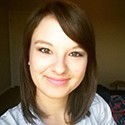
Name: Allie M.
Type of Cancer: Grade III Anaplastic Ependymoma
Diagnosed: Age 24, 2016
By: Allie
— Categories:
Adult
Brain
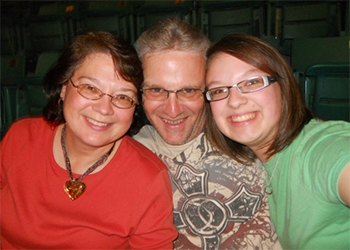 I am the proud daughter of a brain cancer survivor. When I was two-years-old, and my father was thirty-one, he was admitted to the hospital after having a seizure. A few days later, he had surgery to remove the tumor and has been well and cancer-free since that day. My dad’s miraculous story is something I’ve had the pleasure of telling for over two decades. I’ve always admired his strength, but also recently experienced the reality of facing something so terrifying. It wasn’t until I was twenty-four and staring at my own scary MRI that I truly appreciated how blessed we were as a family to live so “normally.”
I am the proud daughter of a brain cancer survivor. When I was two-years-old, and my father was thirty-one, he was admitted to the hospital after having a seizure. A few days later, he had surgery to remove the tumor and has been well and cancer-free since that day. My dad’s miraculous story is something I’ve had the pleasure of telling for over two decades. I’ve always admired his strength, but also recently experienced the reality of facing something so terrifying. It wasn’t until I was twenty-four and staring at my own scary MRI that I truly appreciated how blessed we were as a family to live so “normally.”
Debilitating Symptoms Begin
The beginning of 2016 brought a week-long bout of terrible nausea, which I assumed to be a stomach virus. But a few weeks later I started experiencing nausea on a more regular basis. I struggled to narrow down what was initiating it at first. As summer approached, I started noticing that the nausea would peak before an event with an unknown or stressful element. It was a form of social anxiety. These symptoms were their worst during a work trip to San Diego. One night we went out for dinner at a restaurant with a live band and dance floor on the patio. Typically, this is a setting I would enjoy, but this night I hurried back to the hotel with debilitating nausea after eating. I was overwhelmed by the number of people and the unpredictability of a crowd that size. I sought counseling for anxiety which helped some, but the problem was never fully resolved. My doctors and I tried switching some of my medications around with no positive changes.
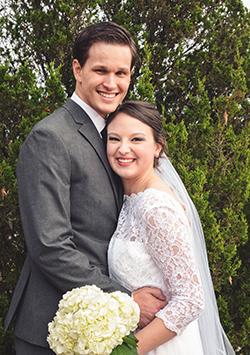 On July 4, I had my first migraine. These headaches were mild, short, and occurred every two or three weeks. I had a visual aura before each headache which indicated it was a migraine. There was a small blind spot to the left of my vision that would begin to flash and grow larger. As it grew my left peripheral vision was greatly impaired. The aura would last about fifteen minutes before the headache would set in. This was a change I thought I would and could live with.
On July 4, I had my first migraine. These headaches were mild, short, and occurred every two or three weeks. I had a visual aura before each headache which indicated it was a migraine. There was a small blind spot to the left of my vision that would begin to flash and grow larger. As it grew my left peripheral vision was greatly impaired. The aura would last about fifteen minutes before the headache would set in. This was a change I thought I would and could live with.
In September of 2016, I noticed the blind spot in the left of my vision was not only permanent but bigger than before. I was having migraines a bit more frequently and with more moderate pain. I saw my optometrist for an eye exam at the beginning of October where he found no issues with my eyes physically. However, he was concerned about the way my brain was processing images. Through a certain peripheral vision test, he was able to see that I had a blind spot in both eyes blocking about 15% of my visual field. Upon discovering this, he contacted my primary care physician and ordered an MRI of my brain.
Doctors Discover a Brain Tumor
On October 13, 2016 I had my MRI in the early afternoon and was called into my primary doctor’s office two hours later. My husband, Mitch, and my parents joined me at the appointment. When the physician walked into the room he didn’t waste any time telling me, “You have a brain tumor.” These words still ring in my ears as I was in so much shock. I looked at my parents and immediately thought about the agony my mother must be reliving. She’s heard this news before about her husband and now her daughter. I looked at my husband and simply wept into his arms. My dad stayed strong on the outside, collecting all the information the doctor was spewing out about an appointment they scheduled for me the next day.
The following morning, we met with a neurosurgeon in Kansas City. He gave us great information including how confident he was that the tumor could be removed completely.
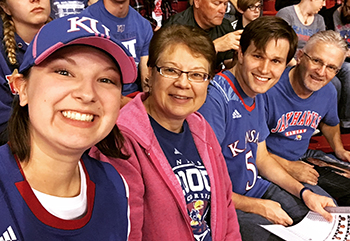 The two weeks between diagnosis and surgery were the most intense fourteen days of my life, not only emotionally, but also physically. I was experiencing very severe migraines once or twice a day for about three hours each. Mitch was able to stay home from work with me most of the time. As Christians, the Lord showed us many examples of strength, courage and teamwork in each other. Before I was diagnosed my grandmother – Nana, as we call her – encouraged me with a Scripture that helped her in hard times. Isaiah 41:10 says, “Do not fear for I am with you. Do not be afraid for I am your God. I will strengthen you and help you. I will uphold you with my victorious right hand.” I clung to these words leading up to surgery and during recovery.
The two weeks between diagnosis and surgery were the most intense fourteen days of my life, not only emotionally, but also physically. I was experiencing very severe migraines once or twice a day for about three hours each. Mitch was able to stay home from work with me most of the time. As Christians, the Lord showed us many examples of strength, courage and teamwork in each other. Before I was diagnosed my grandmother – Nana, as we call her – encouraged me with a Scripture that helped her in hard times. Isaiah 41:10 says, “Do not fear for I am with you. Do not be afraid for I am your God. I will strengthen you and help you. I will uphold you with my victorious right hand.” I clung to these words leading up to surgery and during recovery.
The pathology report stated my tumor was grade III anaplastic ependymoma, the most aggressive type in its category. My dad and husband immediately started researching anything and everything with this new long word we never knew existed before. They quickly found the CERN Foundation and knew they hit the jackpot. It was here that we found clear information that gave us peace of mind and hope in a time that felt riddled with uncertainty.
In December, following surgery and a smooth recovery, I started radiation therapy to reduce my risk of the tumor returning. I had thirty treatments over the course of six weeks targeted at the site where the tumor was removed. The treatments themselves were easy but the side effects were tougher to deal with. I started losing hair about two weeks into treatment and was so greatly fatigued in the last few weeks.
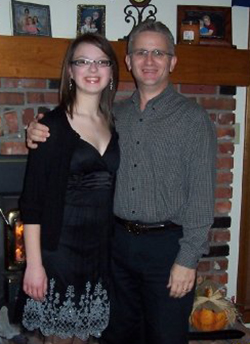 How The Ependymoma Journey Changed Me
How The Ependymoma Journey Changed Me
My dad and I have always been close and at a young age we established a great relationship where we could talk about anything. Our connection has grown and we now share a bond that is very unique. Having brain surgery was not our top choice for shared experiences but it has had a great affect on us. I was able to call him one evening after surgery to simply ask, “When will my head quit itching!?” I’ve greatly enjoyed listening to the way his journey changed him as I feel I’ve also changed so much. It has been wonderful for my husband to be able to talk with my mom as well. The journey of a cancer caregiver is very challenging in its own ways.
I have gone back to work full-time as a dental hygienist and at my latest check-up in March 2017, it was stated many times that my “MRI looks beautiful.” The brain that surrounded the tumor has filled in the cavity nicely and my vision is slowly improving. The blind spot only impairs 9% of my vision now and has potential to shrink further. However, if I have a small impairment for the rest of my life, I’ll accept it like the scar on the back of my head as a reminder of the grand miracle that is surviving my ependymoma.
